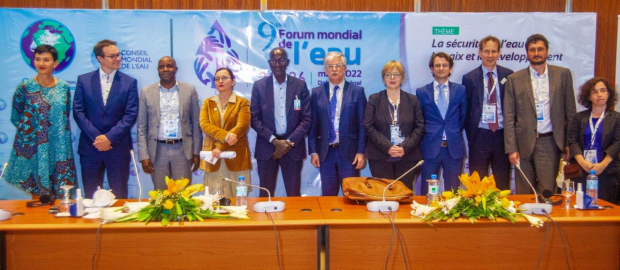World Water Forum – EU announces Team Europe Initiative on Transboundary Water Management in Africa
Discussion details

Dakar, 24 March 2022.- At the 9th World Water Forum, Deputy Director-General for International Partnerships, Marjeta Jager, announced a new Team Europe Initiative to support transboundary water management in Africa.
“This is a joint endeavour by all parties involved to build together a comprehensive framework for transboundary water management. We are here to deliver on regional integration and sustainable development within this framework. I am proud to announce that this initiative should cover 60% of the African territory and benefit 900 million people. Ladies and gentlemen, it is time to act, to sit down together as we are doing now and contribute to the success of this initiative”, said Marjeta Jager.
The European Union and its Member States, together with the European Investment Bank, the African Union and the African Ministers' Council on Water, are working together to set up this new flagship initiative that will harness the potential of water for domestic consumption, agriculture, fishing, energy, goods transportation, biodiversity and the environment.
Through cooperation and peer learning, European and African countries will develop strategic policies and knowledge to better manage water resources against global changes, such as climate change and population growth.
Cross-border investments in water will be stimulated, enabling economic development and regional integration, as well as generating benefits for biodiversity, the environment, peace and stability in the continent.
By contributing to the African Union’s 2063 Agenda and Sustainable Development Goal Six, Team Europe will make water a vehicle for peace and prosperity.
Building on the vision of the EU-Africa partnerships

The EU-Africa partnership vision stresses that coming alliances will be based on mutual interest and green growth models building around five main areas: “green transition and energy access”, “digital transformation”, “sustainable growth and jobs”, “peace and governance”, and “migration and mobility”.
Across all these partnerships, water plays a vital role for life, health, food, biodiversity, climate, societal resilience, economy and trade. However, even though it is ranked as one of the most important sectors for Africa’s growth, water still faces shortfalls in investment and lacks political attention.
Drawing on this observation, water security constitutes one of the priorities sought by the “African Union Agenda 2063: The Africa We Want”, and has the potential to unlock greater progress in terms of direct human benefits, economic benefits, and environmental benefits.
The European Team Initiative on Transboundary Water Management in Africa will work alongside African organizations to give water the central role it plays in addressing emerging challenges and achieving the vision of the EU-Africa partnerships.

(1)
Log in with your EU Login account to post or comment on the platform.
I would suggest to partner with existing initiatives like the Blue Lifelines for a Secure Sahel (BLiSS) which is a transformative initiative that will bring focus on water management and accelerate the safeguarding, restoration and sustainable use of the wetland ecosystems, including rivers, lakes, floodplains and deltas in the Sahel region.
The Sahel is a vast region, rich in natural resources. It is connected by rivers, deltas and lakes supporting centuries-old cultures and societies that have developed complex strategies to withstand a harsh environment. However, climate change, weak governance and a growing number of people living in poverty are posing numerous development and security challenges.
BLiSS is a long-term initiative, driven by a unique consortium of international and African partners with decades of experience, regional presence, complementary knowledge and expertise relevant to water management, wetland ecosystems, resilience and peace-building. The core partners are Wetlands International, CARE, International Alert and the International Water Management Institute. Together, we are building a wider alliance in the region of government agencies, private sector and civil society organisations to catalyse change and achieve ambitious goals and long-term impact.
https://www.wetlands.org/casestudy/bliss/